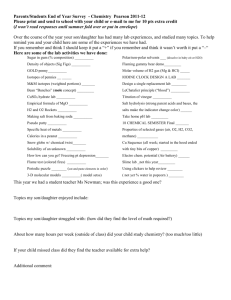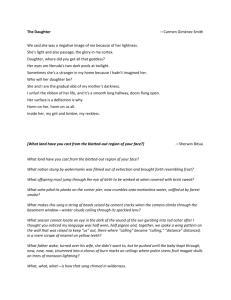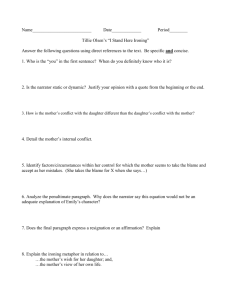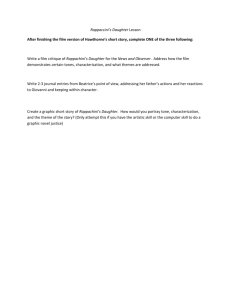Sample letter to send to parents on the first day of
advertisement
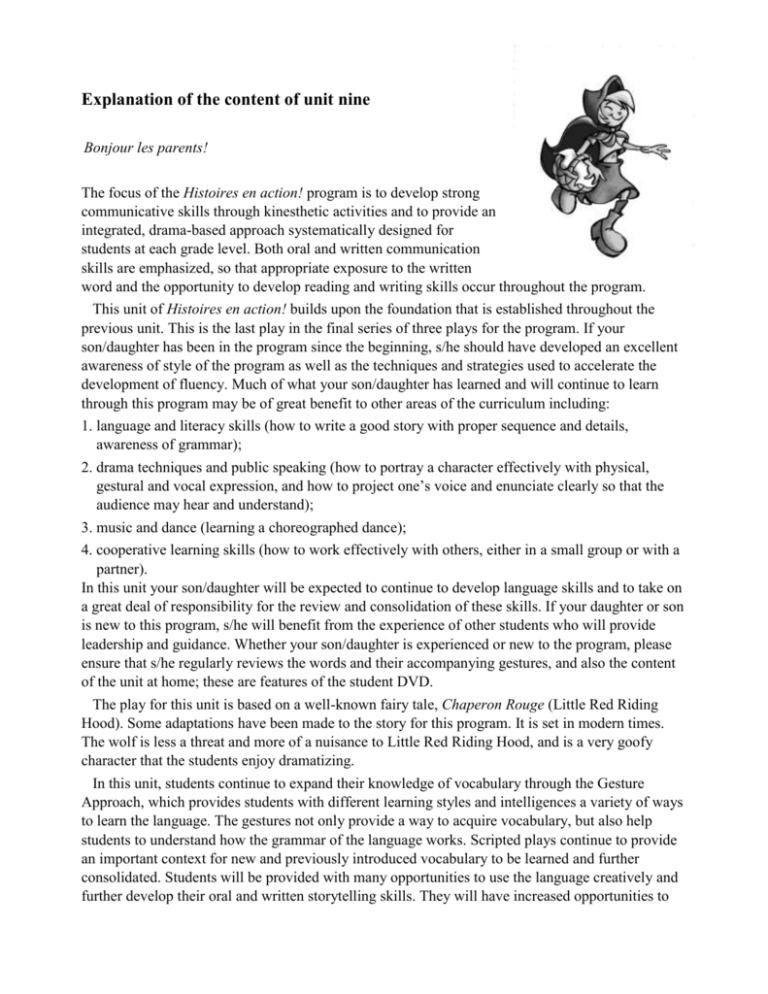
Explanation of the content of unit nine Bonjour les parents! The focus of the Histoires en action! program is to develop strong communicative skills through kinesthetic activities and to provide an integrated, drama-based approach systematically designed for students at each grade level. Both oral and written communication skills are emphasized, so that appropriate exposure to the written word and the opportunity to develop reading and writing skills occur throughout the program. This unit of Histoires en action! builds upon the foundation that is established throughout the previous unit. This is the last play in the final series of three plays for the program. If your son/daughter has been in the program since the beginning, s/he should have developed an excellent awareness of style of the program as well as the techniques and strategies used to accelerate the development of fluency. Much of what your son/daughter has learned and will continue to learn through this program may be of great benefit to other areas of the curriculum including: 1. language and literacy skills (how to write a good story with proper sequence and details, awareness of grammar); 2. drama techniques and public speaking (how to portray a character effectively with physical, gestural and vocal expression, and how to project one’s voice and enunciate clearly so that the audience may hear and understand); 3. music and dance (learning a choreographed dance); 4. cooperative learning skills (how to work effectively with others, either in a small group or with a partner). In this unit your son/daughter will be expected to continue to develop language skills and to take on a great deal of responsibility for the review and consolidation of these skills. If your daughter or son is new to this program, s/he will benefit from the experience of other students who will provide leadership and guidance. Whether your son/daughter is experienced or new to the program, please ensure that s/he regularly reviews the words and their accompanying gestures, and also the content of the unit at home; these are features of the student DVD. The play for this unit is based on a well-known fairy tale, Chaperon Rouge (Little Red Riding Hood). Some adaptations have been made to the story for this program. It is set in modern times. The wolf is less a threat and more of a nuisance to Little Red Riding Hood, and is a very goofy character that the students enjoy dramatizing. In this unit, students continue to expand their knowledge of vocabulary through the Gesture Approach, which provides students with different learning styles and intelligences a variety of ways to learn the language. The gestures not only provide a way to acquire vocabulary, but also help students to understand how the grammar of the language works. Scripted plays continue to provide an important context for new and previously introduced vocabulary to be learned and further consolidated. Students will be provided with many opportunities to use the language creatively and further develop their oral and written storytelling skills. They will have increased opportunities to take responsibility for their own learning as there will be much less teacher-centred work and more opportunity for students to apply their language skills and to develop their oral and written fluency through partner and group work. Learning and applying refinements of the language (focus on grammar) is another focus of the program at this stage, and the students will be expected to continue to demonstrate an improvement in their ability to identify and self-correct targeted grammatical elements. The teacher-led activities will provide opportunities for modelling of new concepts and guidance during whole-class creative writing to ensure further development in this area. This play, like the others, is integrated (both in content and linguistically) with a French song, and music continues to play an important role in language development. French is the language used in all classroom interactions. At the end of this unit, your son/daughter will make another presentation to classes in the school and to family members. Once again, at-home DVD support with the accompanying text is available for your daughter or son as s/he progresses through this unit. The DVD contains all the gestured vocabulary taught, as well as the play and dance performed by students for the unit Chaperon Rouge et le loup fou. Aspects of grammar can also be practised at home with the DVD. Written support for most of what is viewed will be sent home so that students who learn more easily with support of the written word will be able to refer to such items as the script and the word lists. A few minutes spent several times each week watching different segments of the DVD is a beneficial review for your son/daughter. A suggested schedule for practising with the DVD accompanies this letter. Please encourage your son or daughter to spend some time reviewing the gestures, play, song, raps, language refinement activities and dance. Don’t hesitate to ask your son/daughter to explain the various components of the DVD. In this unit, students will: • • • • • • view, listen to and read the play Chaperon Rouge et le loup fou; memorize lines from the story; recognize words and their meanings within the context of the play; dramatize the play, responding in a personal way; read the text to the teacher and each other; extract specific information to ask and respond to knowledge and comprehension-based questions orally and in writing; • manipulate the language in written form through a variety of structured and creative written activities; • manipulate the language in oral form in structured and creative activities as well as spontaneously with teacher and peers; • compare/contrast and describe characters, settings and events in the play; • learn to sing the song Chaperon Rouge et le loup fou and perform the dance; • write about personal experiences in their journal; • identify words and sentences through gesture activities and produce the gestures for the words from vocabulary levels 1A, 1B, 2A, 2B, 3A, 3B and 3C; • demonstrate a good knowledge of associative vocabulary introduced so far from vocabulary levels 1A, 1B, 2A, 2B, 3A, 3B and 3C; • learn to to identify and produce, orally and in writing, the correct form of double verb constructions (verb plus infinitive) of verbs introduced so far; • consolidate their knowledge of the past tense (le passé), both le passé composé and l’imparfait in the context of journal writing and storytelling; • learn to identify the correct form of verbs that have irregular plural forms in the present tense; • learn to identify other grammatical concepts such as contractions (au, aux, du and des); • demonstrate an awareness of and ability to apply spelling rules in French and to spell highfrequency words correctly; • learn the rules pertaining to the grammar concepts called les règles en rap and how to apply them in oral and written language; • review the subjects vous and nous and all corresponding verb knowledge; • review the distinction between the toi/tu and vous forms; • continue to review the placement of the object pronouns, review the direct objects le, la and les, and learn the indirect objects, lui and leur; • perform Creative Improvisational Storytelling for others; • learn more about opposites in Les contraires partner game; • do a formal analysis of what makes a good story; • write creatively and demonstrate an improved awareness of how to paraphrase and add detail to embellish a story retelling; • write a favourite fairy tale in their own words, in French; • while engaging in creative writing, include and prove the use of certain aspects of grammar or vocabulary by identifying (underlining, circling, etc.); • peer-correct oral language use through les euros correction system; • write about personal experiences through journal writing, in order to apply their knowledge of the past tense and use it when describing feelings, thoughts about their lives and events that have occurred during the preceding week; • learn an error-correction system of codes (introduced in unit seven and used with increasing independence in units eight and nine) that helps students take responsibility for and become independent in the correction of their errors. Assessment Assessment will take a variety of forms including anecdotal, performance and product-based: • observation of participation in large- and small-group oral language activities; • summative assessment of final production of play and dance for an audience; • ongoing assessment of reading in small-group play rehearsals, reading of class-created and peercreated works; • ongoing assesssment of the ability to demonstrate knowledge and comprehension of spontaneous and stuctured interactions; • assessment of structured written language-manipulation activities; • assessment of the ability to use the language creatively and with increasing correctness in spontaneous speech and creative oral/written activities based on the unit story; • assessment in large- and small-group sessions, of students’ vocabulary knowledge through their ability to identify, by gesturing and/or naming, individual words and their associations as well as full sentences; • assessment of students’ ability to apply their knowledge of correct grammar and spelling in creative writing, games and spontaneous language in whole-class, small-group and partner activities; • ongoing observation of the developement of spontaneous fluency through daily interactions in French among peers and with the teacher. Homework Students will be expected to spend five to ten minutes a night reviewing lines for rehearsal and performance, reviewing gestured vocabulary introduced during previous lessons, and practising the song and dance. Sincerely, Request for assistance in providing rewards for the card system Dear Parents, Now that the students have progressed through a series of units in the Histoires en action! program, they consistently communicate spontaneously with peers in French. These ongoing and increasingly prevalent opportunities for spontaneous interaction ensure that the students continue to improve and refine their language skills. Students are expected to take responsibility for their use of French and to monitor this on a daily basis. The card system that was established at the beginning of the program continues to be used successfully, ensuring that students not only are aware that they are using French exclusively, but are accountable to themselves and to one another. It is up to each student to decide whether s/he will use French exclusively in the classroom and, in doing so, have direct input on the participation comment on the report card. Your son’s/daughter’s exclusive use of French will not only reflect positively in the effort and participation comment, but will consistently result in higher achievement levels overall, both in oral and written fluency in French. At the end of class, the students who have spoken exclusively in French throughout the entire class time will have the opportunity to take a card, write their name on the back of it and place it in a box. Every four to six weeks, students will count their cards, I will add up the number of cards each student has earned and then we will draw three names from the box. The students whose names are chosen will win a small prize, a token of thanks from me to support the efforts that the students are making. Again, we ask you to help us collect items as rewards for this end-of-the-month activity. If you have any small items in good condition, such as toys, pencils, stickers, CDs, etc. that you would like to donate, they would be greatly appreciated. You may send these items to the school with your son or daughter, addressed to my attention. Thank you in advance for your help! Merci! Letter describing the at-home DVD support component of the program Bonjour! As you know, our story and song for this unit, Chaperon Rouge et le loup fou, will eventually be performed as a play and accompanying song and dance. A DVD is available containing all the gestured vocabulary for students to review, as well as the plays and dances performed by students. The DVD will also help your son/daughter better understand other aspects of the program. The student DVD is accompanied by a word list, as well as the text for the play, the song, the raps and the grammatical refinements. This valuable resource parallels and supports the in-class French program. Have your daughter/son spend a few minutes each day to watch different segments of this DVD as a helpful review. An easy-to-follow schedule in English for your reference, based on the activities that students are working on in class each week, accompanies this letter. Your daughter/son has the same schedule in French for her/his reference. S/he can review previously introduced vocabulary or reinforce new content and grammatical concepts by practising all aspects of the program with the DVD. Your child may decide to concentrate on one specific activity for additional review or spend time watching the several components of the DVD. Don’t hesitate to ask your son/daughter to explain the various aspects of the DVD or to view the play or practise the gestures, rap or song and dance with you. Sincerely, Request for puppets for Creative Improvisational Storytelling Dear Parents, In this unit, the students will once again have the opportunity to develop their imaginations and fluency in French as they learn to spontaneously create stories in an activity called Creative Improvisational Storytelling. We are continuously looking for puppets to supplement the paper puppets that are provided with the Histoires en action! program and we would welcome any donation of puppets made of felt or other fabric for this activity. If you find a puppet or two at home that you would like to donate to your son’s/daughter’s French class, please send the puppet(s) in a bag marked ‘Donation to the French program.’ We will gladly give a home to your puppets and put them to good use in the classroom! Thank you again very much for your assistance with this! Merci! Explanation of the portfolio presentation Dear parents of Grade__________, As we have now completed the unit entitled Chaperon Rouge et le loup fou, your son/daughter is bringing home today the portfolio of French activities that s/he has been working on during the past few months in French class. As you have already seen other presentations, you know how important and valuable this sharing time with parents and other family members is, and what an important link it provides between home and school. As your son’s/daughter’s skills increase, it is very important that your child has the opportunity to proudly share with the family what has been learned. It is also important that your son/daughter feels that you support the learning that has occurred in class. In this portfolio your son/daughter will share with you two samples of creative writing. One is a story retelling and the other is a creative story. For the retelling, your son/daughter was required to retell the whole story in her/his own words, using vocabulary and word order different to that of the play. Your son/daughter was also encouraged to include as many details as possible and to embellish the story, making it her/his own as much as possible. For the other creative writing piece, your son/daughter selected a favourite fairy tale and wrote her/his own version in French. For this unit’s portfolio presentation, please ask your son/daughter to: • read the story Chaperon Rouge et le loup fou in booklet form; • • • • • • • • • read the activity sheets containing questions and other activities based on the story; act out the story as a play, with puppets; perform the dance and sing the song Chaperon Rouge et le loup fou; show you the gestures s/he has learned from the list 3C vocabulary; read the creative story retelling and the fairy tale entitled ___________________________ written cooperatively by the class; read the creative story retelling and fairy tale written by your son/daughter; read the creative story written based on La vie en action!; perform les règles en rap!; retell the story of Chaperon Rouge et le loup fou orally by paraphrasing in her/his own words. Please keep in mind that it is best that your son/daughter make the presentation to you within the first few days that s/he brings the work home, as it is fresh in her/his memory, and s/he will therefore find the greatest level of success. Attached please find the form that you are to complete and return in the envelope before the end of this week. We hope that you enjoy the presentation. Once again, thank you very much for your cooperation with this! Salut!

